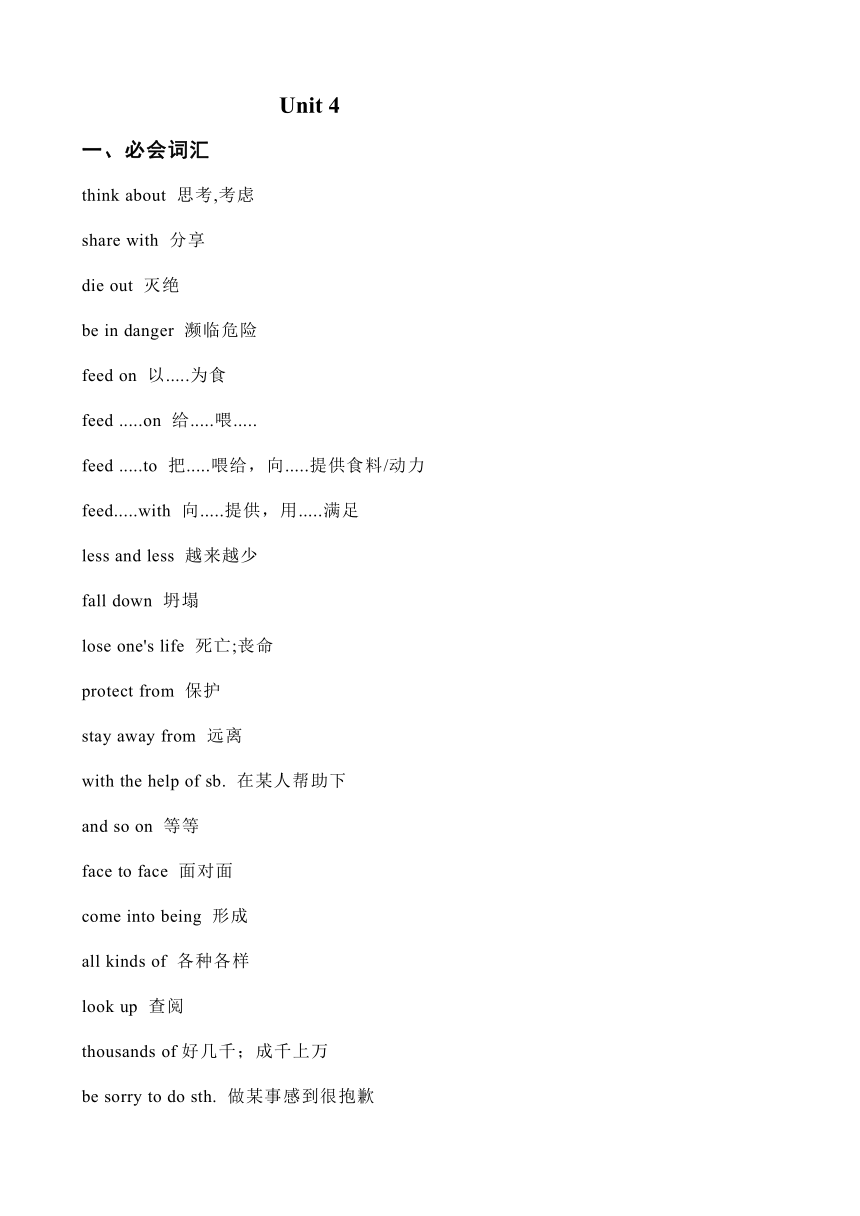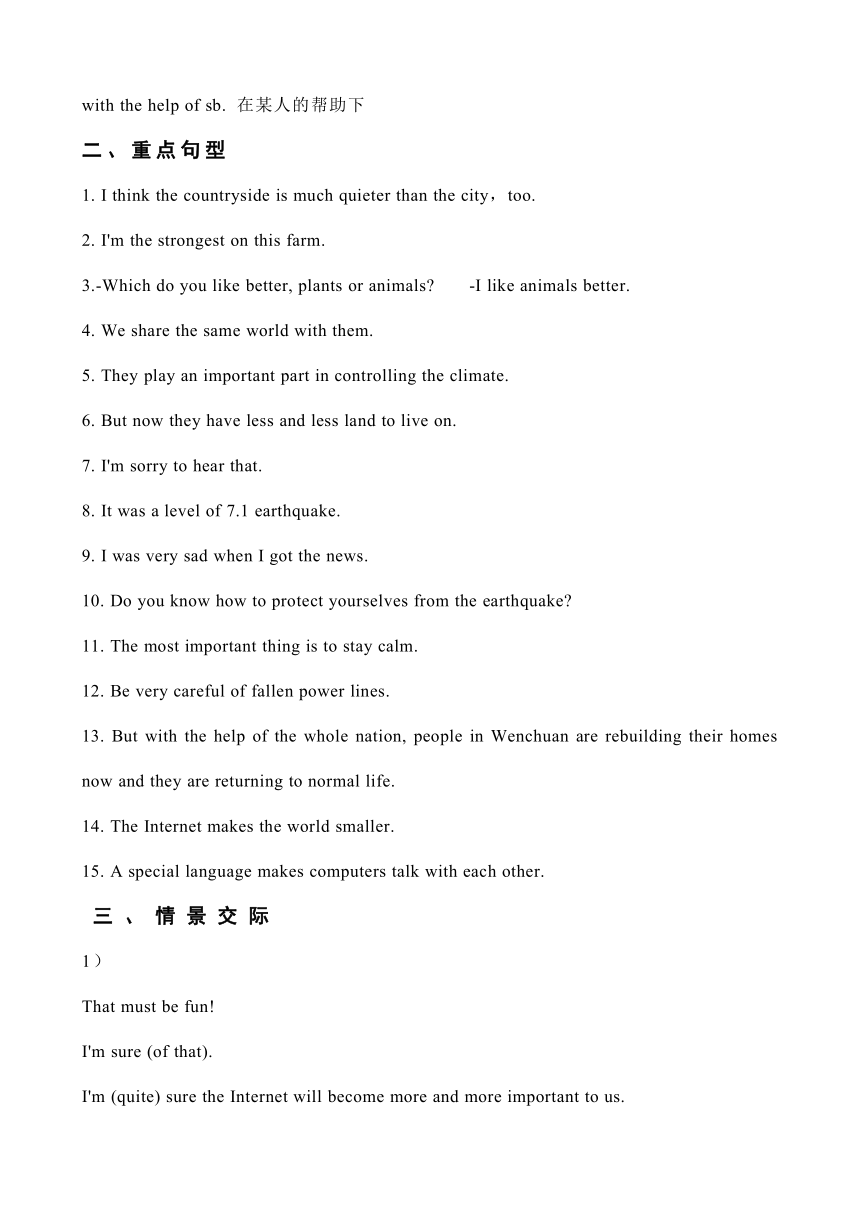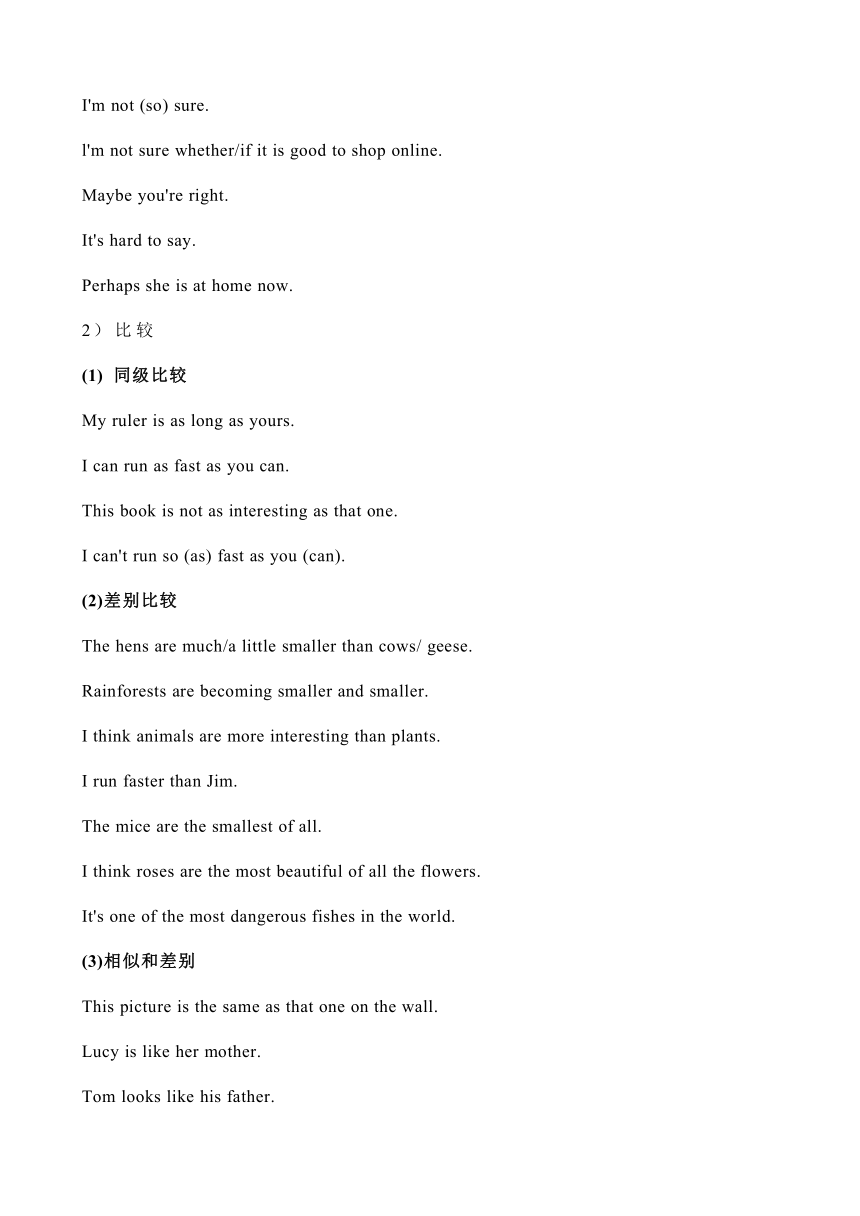Unit 4 Our World必会词组汇总&同义词(组)辨析
文档属性
| 名称 | Unit 4 Our World必会词组汇总&同义词(组)辨析 |  | |
| 格式 | docx | ||
| 文件大小 | 25.6KB | ||
| 资源类型 | 教案 | ||
| 版本资源 | 仁爱科普版 | ||
| 科目 | 英语 | ||
| 更新时间 | 2023-12-17 08:41:33 | ||
图片预览



文档简介
Unit 4
一、必会词汇
think about 思考,考虑
share with 分享
die out 灭绝
be in danger 濒临危险
feed on 以.....为食
feed .....on 给.....喂.....
feed .....to 把.....喂给,向.....提供食料/动力
feed.....with 向.....提供,用.....满足
less and less 越来越少
fall down 坍塌
lose one's life 死亡;丧命
protect from 保护
stay away from 远离
with the help of sb. 在某人帮助下
and so on 等等
face to face 面对面
come into being 形成
all kinds of 各种各样
look up 查阅
thousands of好几千;成千上万
be sorry to do sth. 做某事感到很抱歉
with the help of sb. 在某人的帮助下
二、重点句型
1. I think the countryside is much quieter than the city,too.
2. I'm the strongest on this farm.
3.-Which do you like better, plants or animals -I like animals better.
4. We share the same world with them.
5. They play an important part in controlling the climate.
6. But now they have less and less land to live on.
7. I'm sorry to hear that.
8. It was a level of 7.1 earthquake.
9. I was very sad when I got the news.
10. Do you know how to protect yourselves from the earthquake
11. The most important thing is to stay calm.
12. Be very careful of fallen power lines.
13. But with the help of the whole nation, people in Wenchuan are rebuilding their homes now and they are returning to normal life.
14. The Internet makes the world smaller.
15. A special language makes computers talk with each other.
三、情景交际
1)
That must be fun!
I'm sure (of that).
I'm (quite) sure the Internet will become more and more important to us.
I'm not (so) sure.
l'm not sure whether/if it is good to shop online.
Maybe you're right.
It's hard to say.
Perhaps she is at home now.
2)比较
(1) 同级比较
My ruler is as long as yours.
I can run as fast as you can.
This book is not as interesting as that one.
I can't run so (as) fast as you (can).
(2)差别比较
The hens are much/a little smaller than cows/ geese.
Rainforests are becoming smaller and smaller.
I think animals are more interesting than plants.
I run faster than Jim.
The mice are the smallest of all.
I think roses are the most beautiful of all the flowers.
It's one of the most dangerous fishes in the world.
(3)相似和差别
This picture is the same as that one on the wall.
Lucy is like her mother.
Tom looks like his father.
My picture is different from yours.
There are five differences between the two pictures.
三、同义词(组)辨析
1. be made up of/ be made of / be made from/ be made in /be made into
(1) The paper _____ wood.
(2) The desk _____ wood.
(3) This piece of wood will _____ a small bench.
(4) The computer _____ China.
(5) Our class _____ four groups.
[分析比较]
be made up of 由....组成;
be made of 由....制成(从成品中能够看出原材料);
be made from 由......制成(从成品中不能够看出原材料);
be made in 由(某地)出产; be made into 被制成。
(1)题意为“纸是用木做的。”(产品“纸”不能够看出原材料是“木”)故填is made from。
(2)题意为“书桌是用木做的。”(产品“书桌"能够看出原材料是“木")故填is made of。
(3)题意为“这块木板将要被制成一个小板凳。”故填be made into。
(4)题意为“这台电脑是在中国制造的。”故填is made in。(5)题意为“我们班由四个小组组成。”故填 is made up of。
2. take the place of/ take one's place / in place of / take place
(1) Mr. Wu will _____ Miss Chen to teach us English this term.
(2) There is no room for you now. _____ , please.
(3) Mr. Wu will teach us English _____ Miss Chen this term.
(4) The film festival will _____ in October.
[分析比较] take the place of 和 take one's place 均为动词短语,意思分别是“代替某人的职务”,“坐某人的座位”。前者须接宾语; 后者不接宾语。
(1)题意为“这学期吴老师将代替陈老师教我们英语”,Miss Chen为宾语。故填 take the place of。
(2)题意为“现在没有空位了,请坐我的位置。”故填 Take my place。
in place of 意为“代替",是介词短语,多作状语。
(3)题意为“吴老师代替陈老师教我们英语。”而且句子结构要求填非谓语形式。故填 in place of。
take place 指“(根据安排或计划)举行;发生”。
(4)题意为“电影节将在十月举行。”故填 take place。
3. live/ living/ alive/ lively
(1) Have you seen a _____ dinosaur(恐龙)
(2) Is the snake _____ or dead
(3) What a _____ girl she is!
(4) Her story is _____ and interesting.
[分析比较] live, living 和alive都可作形容词,意思是“活着的, 有生命的”。live 和living用法相同,可作表语或定语,而alive多作表语,作定语时,一般放在它所修饰的名词后; live用作形容词时还可译为“现场直播的;现场演出的”。
(1)题意为“你见过活的恐龙吗 ”句子缺少定语。故填live或living。
(2)题意为“那条蛇是活的还是死的 ”句子缺少表语。故填alive, live 或living均可。
lively作形容词,意为“活泼的,生动的,充满活力的”。
(3)题意为“她是一个多么活泼的女孩!”故填lively。
(4)题意为“她的故事生动有趣。”故填lively。
4. with+sth. /by+sth.
(1) She was killed _____ a running car.
(2)She cut the apple _____ a knife.
(3)-How did you write the letter -I wrote it _____ a ball pen.
[分析比较] with sth.表示行为主体(人)把该东西当作具体工具使用。
(2)题意为“她用刀子切苹果”。故填with。
(3)题意为“你是用什么写信的 ”“我是用圆珠笔写的。”故填with。
by+sth 表示该东西是行为的主体。
(1)题意为“她被一辆奔驰 的车撞死了。”车是行为的主体。故填by。
by还可表示方式,“通过”的意思。如:
She makes a living by selling books. 她以卖书为生。
5. look for/ find/ find out
(1) You can _____ the post office at the corner of the street.
(2) I _____ her very beautiful.
(3)The police are _____ the missing child everywhere.
(4) Read the story and _____ the answers to the questions.
[分析比较] look for 意为“寻找”,是有目的的寻找,强调“寻找”这一动作。
(3)题意为“警察正在到处寻找那位失踪的孩子。”强调动作和找的过程,不强调结果。故填looking for。
find意为“找到,发现,发觉",通常指找到或发现客观存在的具体的东西或偶然发现某物或某种情况,强调找的结果。故填find。
(1)题意为“你能在街道的拐角处找到书店。”强调结果。
(2)题意为“我发现她很漂亮。”故填find/ found。
find out意为“找出,发现,查明”,多指通过调查、询问、打听研究之后得出某种答案、结论。
(4)题意为“阅读故事并找出答案。”故填find out。
一、必会词汇
think about 思考,考虑
share with 分享
die out 灭绝
be in danger 濒临危险
feed on 以.....为食
feed .....on 给.....喂.....
feed .....to 把.....喂给,向.....提供食料/动力
feed.....with 向.....提供,用.....满足
less and less 越来越少
fall down 坍塌
lose one's life 死亡;丧命
protect from 保护
stay away from 远离
with the help of sb. 在某人帮助下
and so on 等等
face to face 面对面
come into being 形成
all kinds of 各种各样
look up 查阅
thousands of好几千;成千上万
be sorry to do sth. 做某事感到很抱歉
with the help of sb. 在某人的帮助下
二、重点句型
1. I think the countryside is much quieter than the city,too.
2. I'm the strongest on this farm.
3.-Which do you like better, plants or animals -I like animals better.
4. We share the same world with them.
5. They play an important part in controlling the climate.
6. But now they have less and less land to live on.
7. I'm sorry to hear that.
8. It was a level of 7.1 earthquake.
9. I was very sad when I got the news.
10. Do you know how to protect yourselves from the earthquake
11. The most important thing is to stay calm.
12. Be very careful of fallen power lines.
13. But with the help of the whole nation, people in Wenchuan are rebuilding their homes now and they are returning to normal life.
14. The Internet makes the world smaller.
15. A special language makes computers talk with each other.
三、情景交际
1)
That must be fun!
I'm sure (of that).
I'm (quite) sure the Internet will become more and more important to us.
I'm not (so) sure.
l'm not sure whether/if it is good to shop online.
Maybe you're right.
It's hard to say.
Perhaps she is at home now.
2)比较
(1) 同级比较
My ruler is as long as yours.
I can run as fast as you can.
This book is not as interesting as that one.
I can't run so (as) fast as you (can).
(2)差别比较
The hens are much/a little smaller than cows/ geese.
Rainforests are becoming smaller and smaller.
I think animals are more interesting than plants.
I run faster than Jim.
The mice are the smallest of all.
I think roses are the most beautiful of all the flowers.
It's one of the most dangerous fishes in the world.
(3)相似和差别
This picture is the same as that one on the wall.
Lucy is like her mother.
Tom looks like his father.
My picture is different from yours.
There are five differences between the two pictures.
三、同义词(组)辨析
1. be made up of/ be made of / be made from/ be made in /be made into
(1) The paper _____ wood.
(2) The desk _____ wood.
(3) This piece of wood will _____ a small bench.
(4) The computer _____ China.
(5) Our class _____ four groups.
[分析比较]
be made up of 由....组成;
be made of 由....制成(从成品中能够看出原材料);
be made from 由......制成(从成品中不能够看出原材料);
be made in 由(某地)出产; be made into 被制成。
(1)题意为“纸是用木做的。”(产品“纸”不能够看出原材料是“木”)故填is made from。
(2)题意为“书桌是用木做的。”(产品“书桌"能够看出原材料是“木")故填is made of。
(3)题意为“这块木板将要被制成一个小板凳。”故填be made into。
(4)题意为“这台电脑是在中国制造的。”故填is made in。(5)题意为“我们班由四个小组组成。”故填 is made up of。
2. take the place of/ take one's place / in place of / take place
(1) Mr. Wu will _____ Miss Chen to teach us English this term.
(2) There is no room for you now. _____ , please.
(3) Mr. Wu will teach us English _____ Miss Chen this term.
(4) The film festival will _____ in October.
[分析比较] take the place of 和 take one's place 均为动词短语,意思分别是“代替某人的职务”,“坐某人的座位”。前者须接宾语; 后者不接宾语。
(1)题意为“这学期吴老师将代替陈老师教我们英语”,Miss Chen为宾语。故填 take the place of。
(2)题意为“现在没有空位了,请坐我的位置。”故填 Take my place。
in place of 意为“代替",是介词短语,多作状语。
(3)题意为“吴老师代替陈老师教我们英语。”而且句子结构要求填非谓语形式。故填 in place of。
take place 指“(根据安排或计划)举行;发生”。
(4)题意为“电影节将在十月举行。”故填 take place。
3. live/ living/ alive/ lively
(1) Have you seen a _____ dinosaur(恐龙)
(2) Is the snake _____ or dead
(3) What a _____ girl she is!
(4) Her story is _____ and interesting.
[分析比较] live, living 和alive都可作形容词,意思是“活着的, 有生命的”。live 和living用法相同,可作表语或定语,而alive多作表语,作定语时,一般放在它所修饰的名词后; live用作形容词时还可译为“现场直播的;现场演出的”。
(1)题意为“你见过活的恐龙吗 ”句子缺少定语。故填live或living。
(2)题意为“那条蛇是活的还是死的 ”句子缺少表语。故填alive, live 或living均可。
lively作形容词,意为“活泼的,生动的,充满活力的”。
(3)题意为“她是一个多么活泼的女孩!”故填lively。
(4)题意为“她的故事生动有趣。”故填lively。
4. with+sth. /by+sth.
(1) She was killed _____ a running car.
(2)She cut the apple _____ a knife.
(3)-How did you write the letter -I wrote it _____ a ball pen.
[分析比较] with sth.表示行为主体(人)把该东西当作具体工具使用。
(2)题意为“她用刀子切苹果”。故填with。
(3)题意为“你是用什么写信的 ”“我是用圆珠笔写的。”故填with。
by+sth 表示该东西是行为的主体。
(1)题意为“她被一辆奔驰 的车撞死了。”车是行为的主体。故填by。
by还可表示方式,“通过”的意思。如:
She makes a living by selling books. 她以卖书为生。
5. look for/ find/ find out
(1) You can _____ the post office at the corner of the street.
(2) I _____ her very beautiful.
(3)The police are _____ the missing child everywhere.
(4) Read the story and _____ the answers to the questions.
[分析比较] look for 意为“寻找”,是有目的的寻找,强调“寻找”这一动作。
(3)题意为“警察正在到处寻找那位失踪的孩子。”强调动作和找的过程,不强调结果。故填looking for。
find意为“找到,发现,发觉",通常指找到或发现客观存在的具体的东西或偶然发现某物或某种情况,强调找的结果。故填find。
(1)题意为“你能在街道的拐角处找到书店。”强调结果。
(2)题意为“我发现她很漂亮。”故填find/ found。
find out意为“找出,发现,查明”,多指通过调查、询问、打听研究之后得出某种答案、结论。
(4)题意为“阅读故事并找出答案。”故填find out。
同课章节目录
- Unit 1 Playing Sports
- Topic 1 I'm going to play basketball.
- Topic 2 I'll kick you the ball again.
- Topic 3 The school sports meet is coming.
- Unit 2 Keeping Healthy
- Topic 1 You should brush your teeth twice a day.
- Topic 2 I must ask him to give up smoking.
- Topic 3 Must we exercise to prevent the flu?
- Unit 3 Our Hobbies
- Topic 1 What's your hobby?
- Topic 2 What sweet music!
- Topic 3 What were you doing at this time yesterday
- Unit 4 Our World
- Topic 1 What's the strongest animal on the farm?
- Topic 2 How can we protect ourselves from the eart
- Topic 3 The Internet makes the world smaller.
